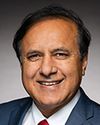Thank you, Madam Chair.
Thank you to all the witnesses for being here.
My question is to all witnesses.
As you know, Canada is in a competition to entice people from around the world to come to study in Canada. We ask them to spend an enormous amount of money to do so. Among the inducements we offer them to study in Canada is the opportunity to work part time while studying and the opportunity to stay in Canada after completing their studies and to work in Canada as part of a pathway to permanent residence and ultimately citizenship.
Recently, a couple of cases of applicants from Pakistan came to my attention. IRCC refused one of the applications on the grounds that it was not satisfied that the student would leave Canada following their studies, based on four reasons, namely “the limited employment prospect in your country of residence; your current employment situation; the purpose of your visit; your family ties in Canada and in your country of residence”.
Isn't this exactly the type of person we expect to respond to our recruitment efforts?
In the other case, the applicant had completed a B.A. in business and wanted to come to Canada to study for an M.B.A. The IRCC officer wrote, “Submissions...do not provide a compelling explanation of why the applicant seeks to pursue Masters Management for future career path”. The officer's notes also state that the applicant “seeks study at a Christian university when the passport of applicant states religion as Islam, and submissions of applicant does not address the divergence of religious beliefs”.
In Ontario, it is not considered unusual that some non-Catholic families, including some Muslim families, prefer to send their children to Catholic separate schools.
Doesn't it seem as though sometimes we are sabotaging our own effort to attract international students? What would you suggest to address these issues?




